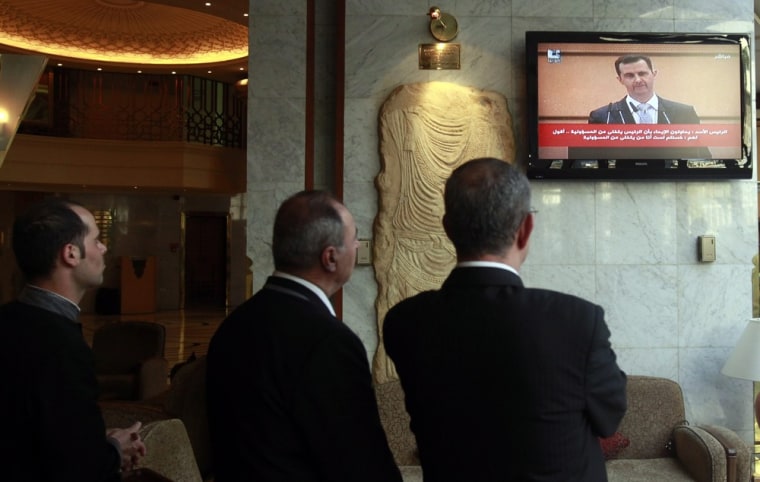Syria's President Bashar Assad said on Tuesday that no orders were given to open fire on protesters, months after his regime began a crackdown on dissent that has killed thousands and led to international isolation and sanctions.
"There is no cover for anyone," he said during a televised speech at Damascus University. " There are no orders for anyone to open fire on any citizen."
The president has made few public appearances since the anti-government uprising began in March, inspired by the revolutions sweeping the Arab world.
The U.N. estimated several weeks ago that more than 5,000 people have been killed since March. Since that report, opposition activists say hundreds more have died.
'We will not be lenient'
Assad also said he would not step down, insisting that he still has his people's support.
"We will declare victory soon ... When I leave this post it will be also based upon the people's wishes," he said in his first speech since he agreed last month to an Arab League plan to halt the government crackdown.
Assad repeated claims that a foreign conspiracy and terrorists are behind the unrest — not true reform-seekers.
"Our priority now is to regain security which we basked in for decades, and this can only be achieved by hitting the terrorists with an iron hand," Assad said. "We will not be lenient with those who work with outsiders against the country."
Assad also accused hundreds of media outlets of working against Syria to "push us toward ... collapse."
"They failed, but they have not given up," he said, standing at a podium between two Syrian flags.
Since the start of the uprising, Assad has blamed media fabrications for the unrest — allegations that the opposition and most observers dismiss. The regime has banned most foreign news outlets and prevented independent reporting.
In recent months, Syria's conflict has turned increasingly violent as army defectors turn their weapons on the regime and some protesters take up arms to protect themselves.
Syria agreed in December to an Arab League-brokered plan that calls for an end to the military crackdown on protesters, but killings have continued.
About 165 Arab League monitors are in Syria to determine whether the regime is abiding by the plan to stop violence and pull heavy weapons out of the cities.
Adnan al-Khudeir, head of the Cairo operations room that the monitors report to, said more observers will head to Syria in the coming days and the delegation should reach 200. He said the mission then will expand its work in Syria to reach the eastern province of Deir el-Zour and predominantly Kurdish areas to the northeast.
Assad, 46, inherited power 11 years ago from his father and has largely followed the playbook of other autocratic leaders in the region who scrambled to put down popular uprisings by offering similar claims of conspiracy while unleashing a relentless crackdown on their people.
The formula failed in Tunisia and Egypt, where popular demands increased almost daily — until people accepted nothing less than the ouster of the regime. But Syria's conflict has gone on far longer, and the death toll is mounting daily.
